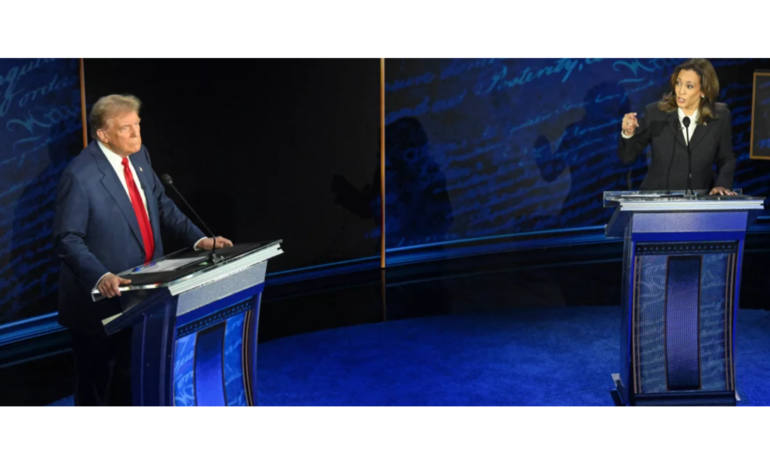
Harris and Trump clash in fiery debate: A deep dive into key claims and fact-checks debate:
By: Dr. Avi Verma
In a highly charged first presidential debate on September 10, Vice President Kamala Harris and former President Donald Trump sparred over crucial issues including abortion, immigration, and economic policies. Hosted by ABC News’ David Muir and Linsey Davis, the debate swiftly shifted from cordial greetings to a heated exchange, with both candidates vigorously defending their positions and challenging each other’s records.
Throughout the debate, numerous statements made by Harris and Trump were scrutinized for accuracy, revealing a mix of misleading claims, factual inaccuracies, and contentious assertions. This detailed analysis breaks down the key points of contention, providing a comprehensive look at how each candidate’s claims stacked up against the facts and offering insight into the broader implications for the 2024 presidential race.
Debate Highlights and Fact-Checks
1. Abortion Claims
- Trump’s Misrepresentations: Trump incorrectly stated that former Virginia Governor Ralph Northam had advocated for infanticide, saying Northam would decide the fate of babies born alive after a late-term abortion. In fact, Northam discussed how, in rare cases where a fetus is nonviable, the baby would be made comfortable, and a discussion with the family would follow. Trump’s claim was false as Northam never suggested doctors would forcibly end the life of a newborn.
- Trump’s Misleading Claims on Roe v. Wade: Trump claimed that all legal scholars, Democrats, and Republicans wanted abortion laws to return to the states. This is inaccurate as many legal scholars and advocates argued for upholding Roe v. Wade or supported different constitutional arguments for abortion rights. Trump’s assertion simplifies a complex and diverse range of legal opinions.
2. Economic and Taxation Issues
- Harris on Trump’s Sales Tax: Harris claimed that Trump’s proposed tariffs would cost middle-class families an additional $4,000 annually. While this estimate is supported by some analyses, others suggest a smaller impact. Trump’s tariff proposals, such as a 10%-20% across-the-board tariff and a 60% tariff on Chinese goods, are separate from sales taxes but would affect consumers similarly.
- Trump’s Claims on Employment Figures: Trump labeled the job creation numbers reported by the Biden administration as fraudulent. However, the adjustment of 818,000 jobs was part of routine data refinement by the Bureau of Labor Statistics, not evidence of fraud. Economists broadly reject Trump’s assertion of deliberate manipulation.
3. Immigration and Crime
- Trump’s Claims About Haitian Immigrants: Trump falsely claimed that Haitian immigrants in Springfield, Ohio, were eating pets. Local authorities confirmed that there were no such reports, debunking Trump’s claim as unfounded and exaggerated.
- Trump’s Immigration Figures: Trump exaggerated the number of immigrants entering the U.S., asserting it was 21 million monthly. The actual number of encounters with immigrants at the border is around 10 million, with many resulting in expulsions or removals. His figures were misleading, conflating encounters with admissions.
- Crime Rates: Trump’s claim that crime was “up and through the roof” was misleading. While the National Crime Victimization Survey showed a 43% increase in violent crime from 2020 to 2022, the FBI’s data indicated a decrease. Recent analyses suggest violent crime is currently declining, though some property crimes have increased.
4. Healthcare and Social Policies
- Affordable Care Act: Trump claimed to have “saved” the Affordable Care Act, despite his administration’s efforts to repeal it and cut funding, which led to a rise in the number of uninsured Americans. His assertion did not align with the reality of his administration’s actions.
- Transgender Healthcare in Prisons: Trump’s claim that Harris supports gender transition surgeries for incarcerated individuals was mostly true. Harris had previously expressed support for such treatments in a 2019 ACLU questionnaire and as California Attorney General. However, her campaign stated that this was not a current focus of her 2024 platform.
5. Project 2025 and Trade Deficits
- Harris’s Misrepresentation of Project 2025: Harris suggested that Trump’s Project 2025 proposed intrusive monitoring of pregnancies. However, Project 2025 focuses on improving abortion data collection rather than monitoring individual pregnancies. Harris’s depiction exaggerated the proposal’s scope.
- Trade Deficit Claims: Harris claimed that Trump’s administration resulted in one of the highest trade deficits in U.S. history. While the 2020 deficit of $654 billion was significant, it was not unprecedented. Trade deficits have been higher under subsequent administrations, including Biden’s.
6. Domestic Oil Production
- Harris’s Statement on Oil Production: Harris correctly noted record levels of domestic oil production under Biden, but the claim that it represented the largest increase ever is partly true. Previous administrations, including Trump’s, saw larger annual increases in oil production. Biden’s administration has approved more drilling permits but did not achieve the largest year-to-year increase.
Post-Debate Reactions
- Taylor Swift’s Endorsement: Shortly after the debate, Taylor Swift announced on Instagram that she would be voting for Kamala Harris, marking a significant celebrity endorsement for the Vice President.
Fact-Checking Overview: The debate saw numerous claims from both candidates that were fact-checked by various organizations. Misleading statements about economic policies, immigration, and healthcare were prominent, underscoring the contentious nature of the debate and the importance of accurate information.